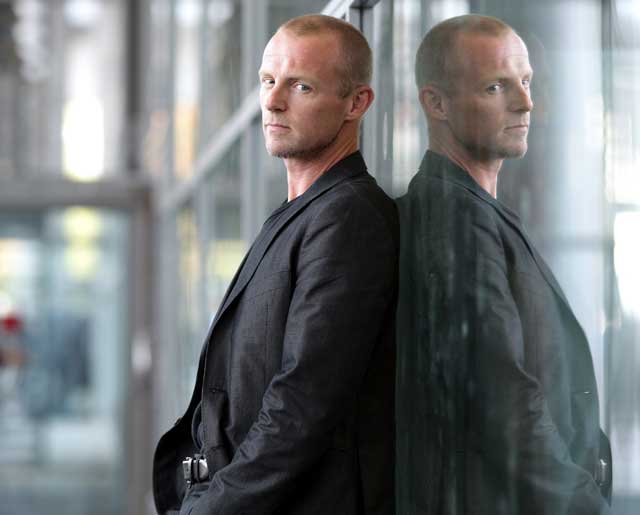The Leopard, By Jo Nesbø, trans.Don Bartlett

The horrific events that concluded Jo Nesbø's The Snowman have taken an enormous toll on Detective Harry Hole, tough and illusion-free though he might be. So when we first meet him in that novel's successor, The Leopard, we are not surprised that he has as good as renounced his Norwegian life, with its network of relationships and obligations. An alcoholic, he now prefers, out in Hong Kong, the temporary oblivions of opium, and so associates not with his usual cronies, fellow law-enforcers, but with law-evaders.
But the reputation Harry has left behind him has its own stubborn life. Many of his cases, pre-eminently that of The Snowman, were not just high-profile but national talking-points and crime-history benchmarks. His credentials as tracker-down of serial killers are unsurpassable. Therefore, when Norway seems plagued by another multiple murderer, with a woman MP among the victims, Kaja Solness from Oslo Police Crime Squad is dispatched to haul Hole out of Hong Kong's stews and dens. She has a psychological weapon to aid her: Harry's father, of whom, as Nesbø readers know, the detective is diffidently fond, is ill - terminally, it transpires. If this can't bring Harry back to Oslo, what could?
A reluctant returnee, Harry nonetheless acknowledges "a huge unalloyed pleasure at being here. In Oslo. Home." For beyond all the squalor and cruelties which he faces in the course of his detective work, beyond the dissatisfactions of his private life, there exist the undyingly fascinating complexities of humanity as evidenced in the city that he, a well-travelled man, knows better than anywhere.
Oslo permeates The Leopard no less than it does Nesbø's other fiction, from the compact city centre and the park of St Hanshaugen, near which lies Harry's often neglected flat, south-east to the 1960s suburb of Manglerud, the native quarter of his newest inside opponent (maverick Harry almost always has one): Mikael Bellman of the rival unit Kripos. Nesbø, a fierce critic of any tendency on Norway's part to think too well of itself (see The Redbreast), is truly one of his capital's great literary celebrants, precisely because he presents it as a variegated whole rather than with a local-colourist's selectivity.
Jo Nesbø says The Leopard is very much Harry Hole's own book, treating his personal development with the amplitude the man, central to seven previous novels, has earned. And Harry's dealings with Øystein, his oldest schoolmate (who suggests that all they had in common was that "no-one else wanted to be pals with us"); with Kaja Solness, whom he cannot ever quite regard as the equal of his former lover, Rakel; with his Down's Syndrome sister, and with his dying schoolteacher father, have the quality of tender inwardness needed to offset the violence and sadistic mayhem.
Yet the book invites one, from its frightening opening pages which detail a woman's torture, terror and death, to undertake a journey of which bemusement, suspense, extreme situations and nervous anxiety are the dominant features. In accepting this we encounter both its most arresting merits, and its disconcerting flaws.
The case for which Hole is brought back to Oslo involves the deaths of a succession of women (and one young man), all of whom spent one night in a remote hostel near Ustaoset, in the heartland of the Norwegian mountains. In winter, visitors travel there by snowmobile over an empty landscape whose contours have been "levelled... until they were one huge ocean in which the tall mountain, Hallingskarvet, towered like a menacing monster wave".
This mountain has its human counterpart: insistent hatred, deriving from painful unassimilated experience and goading its possessor into dealing out suffering and death. Nesbø's insight into inherited conflict – of which this novel affords a disturbing double instance – must emanate from his own declared family background. His father fought for the Germans in the Second World War, his mother for the Resistance, this duality being the emotional foundation of The Redbreast.
Nesbø's imaginative preoccupation with division, above all in the individual, makes him a distinctively Norwegian writer. His mentors – Ibsen, Hamsun - have magisterially contrasted the wild with the harmonious, the lover or explorer with the conscientious citizen, the stern moralist with the easy-going hedonist. This distinguishes him from the Swedes Mankell and Larsson, to whom he is so often compared.
But the huge success of his Hole novels – since August 2010, the UK paperback of The Snowman has sold 250,000 copies – has increasingly set Nesbø both alongside these two writers and (promotionally) against them. The Leopard's unflagging narrative tension, breathtaking surprises and many confrontations with half-suspected treachery (well served by translator Don Bartlett's ear for dialogue) are superb. But Hole's too-numerous physical endurance tests, his breakneck excursions abroad (to the war-beset Rwanda-Congo frontier), fail to satisfy because they so obviously belong to bestsellerdom, despite (maybe because of) the extraordinarily intricate plotting that has arranged them. Nesbø has no need for a-shock-a-page (though mercifully the shocks here are less baroque than in The Snowman). His imagination is forceful enough to play on its riven subjects without sensationalist devices.
Join our commenting forum
Join thought-provoking conversations, follow other Independent readers and see their replies
Comments
Bookmark popover
Removed from bookmarks